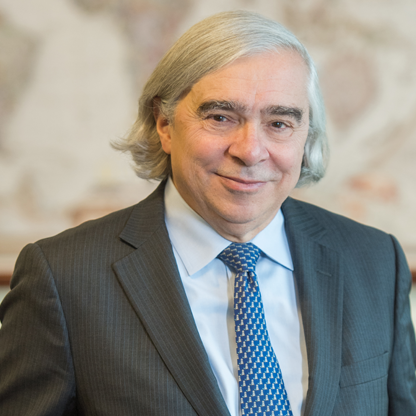Sessions With Dr. Ernest Moniz
Monday, 18 March
-
09:30am - 10:10am (CST) / 18/mar/2024 02:30 pm - 18/mar/2024 03:10 pm
Voices of Innovation: Ernest Moniz
Hear from one of world’s foremost experts on energy, climate change and nuclear power on the outcomes of COP28, nuclear energy development, future of multi-dimensional energy transition and the work of Nuclear Threat Initiative. What were the most significant accomplishments at COP28? How are IRA and IIJA progressing? What is the current state of nuclear threats and risks? And much more …
- Speakers:
- Atul Arya
- Dr. Ernest Moniz
-
02:30pm - 03:10pm (CST) / 18/mar/2024 07:30 pm - 18/mar/2024 08:10 pm
Advanced Nuclear, Microreactors and SMRs: Ready for deployment?
Carbon Management/DecarbonizationAdvanced nuclear reactors, microreactors and Small Modular Reactors or SMRs were once thought to be years away from realization. Recent developments and strong demand signals from new markets, combined with innovation and investment in supply chain and infrastructure, have changed that perspective. What is the new timetable for microreactors to join the mix? What needs to change to make these nuclear concepts navigate the energy transition successfully?
Tuesday, 19 March
-
07:15am - 08:20am (CST) / 19/mar/2024 12:15 pm - 19/mar/2024 01:20 pm
From Hubs to Demand-Support: Catalyzing the American hydrogen market
The U.S. Department of Energy announced earlier this year the selection of a consortium to help accelerate commercial liftoff of the clean hydrogen economy and support the launch of the Regional Clean Hydrogen Hubs. The Hydrogen Demand-Side Initiative (H2DI) is actively working to design robust demand-side support measures that will expedite purchases of clean hydrogen produced by H2Hub-affiliated facilities. During the first public discussion since H2DI’s launch, David Crane (U.S. Under Secretary for Infrastructure) and Sec. Ernie Moniz, chairman of the consortium, will discuss: What is the vision for this initiative? What are approaches for driving clean hydrogen market formation? What types of demand-side support should be considered?
- Speakers:
- Eleonor Kramarz
- Dr. Ernest Moniz
- David Crane
-
12:30pm - 01:00pm (CST) / 19/mar/2024 05:30 pm - 19/mar/2024 06:00 pm
Tripling Nuclear Power by 2050
Climate & SustainabilityAt COP 28 more than 20 countries from four continents launched the Declaration to Triple Nuclear Energy. This commitment elevates and recognizes the importance of Nuclear Energy for a net-zero world. What policy, financing and collaboration efforts will be required to make this goal a reality?

